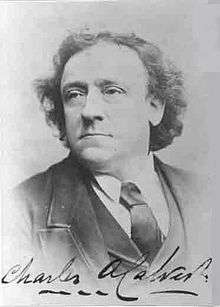Charles Alexander Calvert
| Charles Alexander Calvert | |
|---|---|
 | |
| Born |
28 February 1828 London |
| Died | 12 June 1879 (aged 51) |
| Nationality | British |
| Education | King's College School |
| Occupation | actor, manager |
| Known for |
Theatre Royal, Manchester, Prince's Theatre, Manchester |
Charles Alexander Calvert (28 February 1828 – 12 June 1879) was a British actor and theatre manager noted for Shakespearean "revivals" featuring elaborate staging and historically accurate sets and costumes.
Early life
Calvert was born in London on 28 February 1828, and educated at King's College School. On leaving it he spent some time in the office of a London solicitor and in a mercer's business in St. Paul's Churchyard; but before long he was drawn to the stage, having derived a first impulse towards it from the plays of Shakespeare produced at Sadler's Wells Theatre by Samuel Phelps, from whom Calvert afterwards modestly declared that he had learnt all his art.
Acting career
He first acted professionally in 1852, at Weymouth Theatre, under the management of Edward Askew Sothern, famous for creating the role of Lord Dundreary. Then he played leading parts at Southampton and in South Wales, until in about 1855 he joined the company of Messrs. Shepherd and Creswick at the Surrey Theatre in London, where he played leading youthful parts of a "legitimate" type. A year after his arrival in London he married Adelaide Ellen Biddies, who went on to achieve some stage success in her own right as Mrs Calvert. They had eight children, of whom five (three sons and two daughters) followed their parents' profession, including Louis Calvert, their third son.
In 1859, Calvert became stage-manager and principal actor of the Theatre Royal, Manchester. Five years later in 1864, by then manager of the newly built Prince's Theatre, Calvert began the series of Shakespearean "revivals" which were the chief efforts of his professional life. Convinced that Shakespeare could be "made to pay," he consistently produced plays with elaborate attention to scenery, costume, and every other element of stage effect. The Shakespearean plays "revived" by Calvert were the following:
- The Tempest (1864), with which the Prince's Theatre opened, and which proved a signal success
- Antony and Cleopatra(1866)
- The Winter's Tale (1869)
- Richard III (1870)
- The Merchant of Venice, with Arthur Sullivan's music (1871)
- Henry V (1872)
- Twelfth Night (1873)
- Henry IV, part 2 (1874)
From a draft in his handwriting it appears to have been his intention, had his connection with the Prince's Theatre continued, to crown the series by an arrangement of the three parts of Henry VI together with Richard III in three plays, under the title of The Houses of York and Lancaster. Some of Calvert's less elaborate productions included Byron's Manfred (1867) and other plays by Skakespeare. He generally had a good "stock" company, in which several actors and actresses of mark received their training. The financial viability of the ventures he was associated with seems to have varied. The Prince's Theatre passed into the hands of a company in 1868 who quickly rebuilt it, allowing Calvert to fulfil his promise of providing "dramatic entertainment of the highest class".[1] His connection with the theatre ended in 1875, shortly before which Calvert had staged a very successful production of Henry V in New York. After leaving the Prince's Theatre he produced, at the Theatre Royal, Manchester, Henry VIII in 1877. He also staged Byron's Sardanapalus at Liverpool and at the Theatre Royal, Manchester, and superintended a "replica" at Booth's Theatre in New York.
Later years
His last years were migratory, spent at the head of a travelling company which appeared in Manchester and at other places. Towards the end the state of his health, which had given way four years previously, persuaded him to retire to Hammersmith, where he died on 12 June 1879. The genuine admiration felt for him at Manchester had been shown on the occasion of his first departure for New York by a public banquet (4 January 1875). His funeral at Brooklands cemetery, near Sale in Cheshire, was made the occasion of a popular demonstration. Later in the year (1 and 2 October) a benefit performance of As You Like It was staged in Manchester for his family.
References
- Notes
- ↑ Rudyard & Wyke 1994, p. 48
- Bibliography
- Rudyard, Nigel; Wyke, Terry (1994), Manchester Theatres, Bibliography of North West England, ISBN 0-947969-18-7
![]() This article incorporates text from a publication now in the public domain: "Calvert, Charles Alexander". Dictionary of National Biography. London: Smith, Elder & Co. 1885–1900.
This article incorporates text from a publication now in the public domain: "Calvert, Charles Alexander". Dictionary of National Biography. London: Smith, Elder & Co. 1885–1900.
External links
- Works by or about Charles Alexander Calvert in libraries (WorldCat catalog)
| Wikisource has original text related to this article: |
|